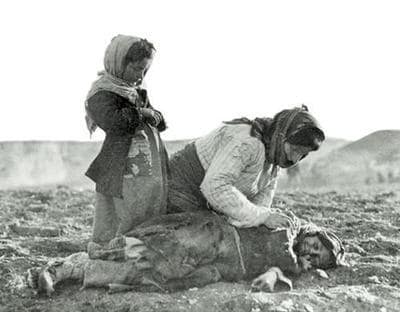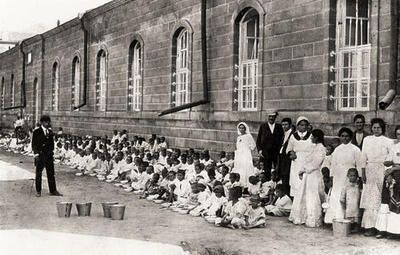Christian evangelist Roger Carswell shares with ET readers an edited version of a booklet first penned by his grandfather, Rev. Sisag Manoogian, at the time of the Armenian genocide (1915-1917).
Sisag was a refugee who experienced 33 miraculous escapes from the Turks. He went on to be a powerful evangelist and pastor, proclaiming the gospel of the Lord Jesus in Turkey, Syria and the Lebanon before his death in 1945.
Married to Marika, they had one son and four daughters (Sisag Manoogian’s biography Out of the ark, by his daughter Rhoda Carswell, is available as an e-book from www.10ofthose.com). Sisag gives us an eye-witness account of how Armenian Christians faced martyrdom a century ago.
Sisag Manoogian said, ‘It is not, of course, intended by this account to give the impression that all Armenians show the Spirit of Christ under persecution. This would be far from the truth; but the roll of true martyrs, whether living or dying, is a noble and long one’.
Forgiveness
The ability to forgive others is the fruit of being a Christian. But what makes a person a Christian is that he or she has actually been forgiven.
Jesus came to earth with the express purpose of suffering and dying on the cross, carrying on himself the rebellion and sin of the world. He died paying the penalty of our wrong. He died that we might be forgiven. When a person puts their trust in Jesus, the risen, living Saviour gives us the ability to follow him and live as he would have us live.
In the Lord’s Prayer are the words, ‘Forgive us our trespasses, as we forgive others’. As we repent and believe, God not only forgives us, but gives us spiritual life and grace to obey his commandments, even to love our enemies.
Christians have a desire that everyone should come to know God’s forgiveness, just as they have done. This means that our ‘enemies’ are now those we desire to see come to know God for themselves.
Dying nation
100 years ago, Sisag wrote: The first-born of the great family of Christian nations is literally dying as a nation. That is the Armenian nation. Not less than one million Armenians have perished during these last seven years.
First the British army came to Cilicia and brought peace and security. Later on, the British withdrew for political reasons and the French army came and brought a policy resulting in devastation.
In addition, France, according to the Angora Treaty, withdrew her army from Cilicia. They told the Christians to choose whether they would stay and trust to the mercy of the Turks, or leave the country.
Crowds of panic-stricken people rushed towards the sea. Cyprus, Syria, Egypt and Smyrna, after accepting some of these refugees, announced they could not accept any more. In upper Armenia, famine and cholera are raging in harmony with the Bolshevik tyranny. In lower Armenia, Cilicia, the terror of the Turks is reigning in harmony with the present policy of the Allies.

Facing death
Twelve men, with grave faces, were met to decide an issue of life or death. No burly criminal stood there to receive punishment for his crimes — only a little child, begging for life. Her sin was hunger and nakedness. She trembled and almost fell as she stretched out thin, bare arms in supplication.
‘Hunger! Bread!’ were the only words she spoke.
A long time passed, while these men fought to escape the verdict they must render. But then the words came: ‘We have not found anyone who will give you bread, little girl. We have told a good many people about you, but they have given to so many other boys and girls that they are tired of giving.
‘There is not enough bread, now, to go round — no, not even a crust. We are very sorry, little girl, but we must let you die’.
A cruel jest? No, a cruel fact, multiplied thousands upon thousands of times.
Everybody knows what the word ‘dying’ means, but everybody does not know the art of dying. To be able to choose the cross with its curse, and death with its terror — especially to transform the agony of death into the joy of heaven — is not a common task. Thank God, many Armenians have been able, by the grace of God, to show that their spiritual life is nearer and dearer to them than material things.
Dignity
Some ferocious gendarmes marvelled when seeing men and women, even children, instead of trembling in the presence of death, show calm and dignity, and instead of cursing, pray for the
forgiveness of their murderers.
In their defencelessness, they tried to defend the weaker ones; in their hunger they shared their last piece of bread with the poorest.
The pastor of the Syrian church in Ourfa saw thousands of women and children, who were exhausted with the journey, and so had to spend one night on the ground and then march on next morning.
He said nearly all were hungry, thirsty, and literally naked. Some of them found pieces of charcoal and wrote on the rocks such words as, ‘As Jesus did not deny us, do not deny him’ and ‘We have not denied him, follow us’.
These were the women who were asked to repeat a short sentence after the Turkish teacher, or lift up their testimonial finger to show that they were willing to accept Islam, which meant they could stay free in their homes. But they refused, choosing rather to suffer and die in the desert.
If this illegitimate Franco-Turkish ‘friendship’, which has been cemented by French policy, should develop and be able to drag in others, then the victorious Turks will tell you boastingly what atrocities they practised on the Christians.

They will acknowledge that the Armenians gave up everything precious, but clung to their Bibles; how they thanked God first before they drank water after five days’ hot journey in the desert without anything to quench thirst; how innocent victims showed wonderful peace and offered earnest prayers for the salvation of Turks and Turkey before the rope was around their necks to hang them.
Atrocities
Over one million Armenians died, but some, by the grace of God, were experts in the art of dying, and these saved the name of Christianity in the presence of their enemies.
I assert that to die for Christ is not so hard as to live for Christ. To live for Christ demands a living and conscious faith and continual contact with Jesus.
When a mother sees the murderer of her son wearing her son’s coat, shoes and watch; when the people see their enemies dwelling in their houses and enjoying the fruits of their gardens, while they themselves are shivering under the patched tents pitched outside the city, in the mud in winter, and in the dust in summer, and are obliged to eat only the rind of their oranges and gnaw bones thrown away; when they see their daughters and wives and young children in the harems of their enemies, and hear their cries and see their tears, but are not able to save them; in short, to experience daily unutterable atrocities and return Christian love and forgiveness, it is much harder than to die for Christ.
Concluded in Armenians,’experts in the art of dying’ – and also in the art of living (2)









